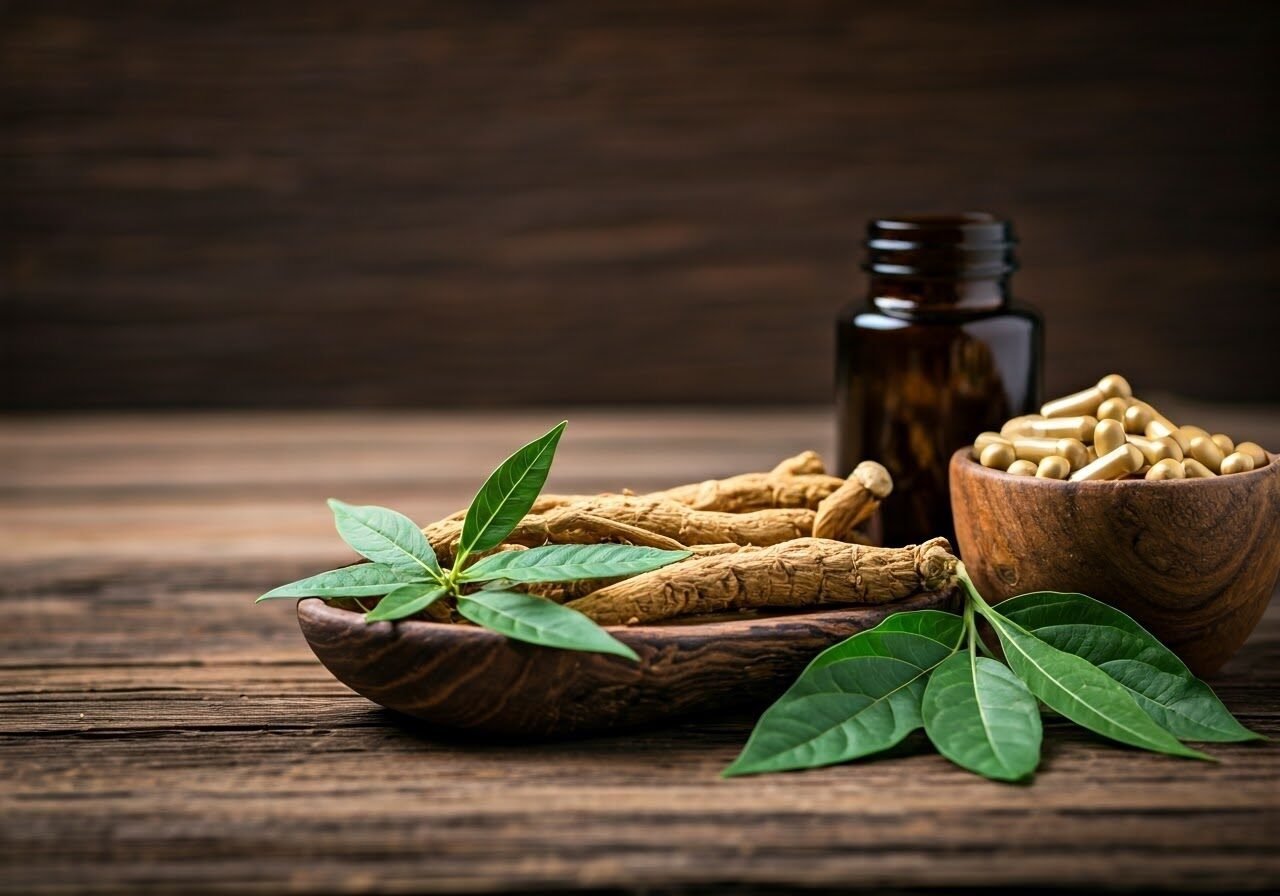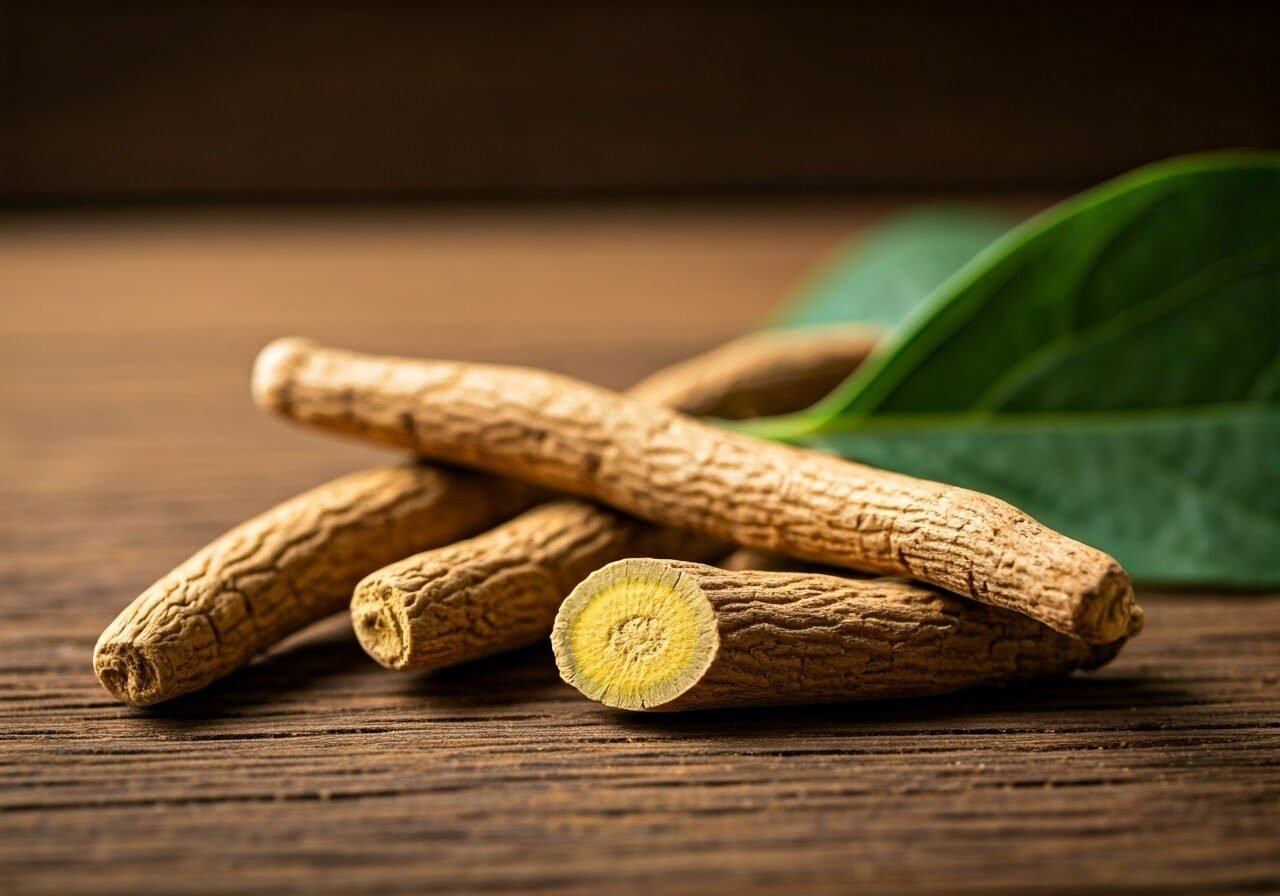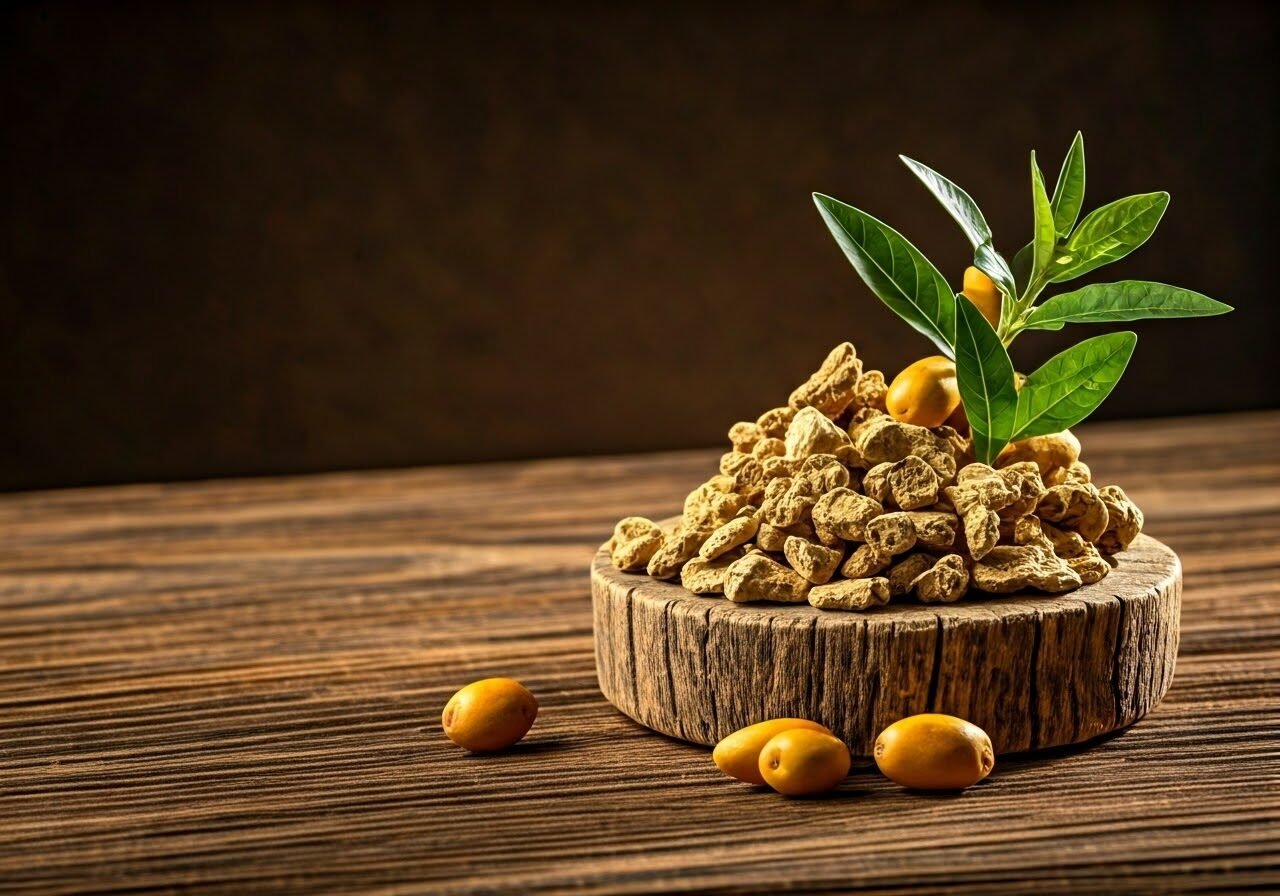
What Is Ashwagandha? Origins and Adaptogenic Power
Ashwagandha, also known as winter cherry and Withania somnifera, is a powerful medicinal herb that has gained significant popularity in recent years for its numerous health benefits. Its name originates from Sanskrit, where “ashwa” means horse and “gandha” means smell, referring to the herb’s strong aroma resembling that of a horse. This herb has been highly esteemed in traditional Ayurvedic medicine for centuries due to its various healing properties.
Ashwagandha is rich in bioactive compounds such as withanolides, alkaloids, and flavonoids found in its roots, leaves, and berries. These compounds contribute to its adaptogenic qualities, which help the body manage stress more effectively. Moreover, ashwagandha is renowned for its anti-inflammatory, antioxidant, and immune-boosting properties.
Recent scientific research has further validated the traditional uses of ashwagandha and uncovered additional potential health benefits, including the clinical effectiveness of Withania somnifera. Studies have shown that ashwagandha may help reduce stress and anxiety levels by lowering cortisol levels in the body. Additionally, it has been linked to improved cognitive function, better sleep quality, and enhanced muscle strength.
Furthermore, ashwagandha’s potential role in managing conditions such as diabetes, arthritis, and even certain types of cancer, including its effects on blood sugar levels, is being explored. Its ability to modulate the immune system and reduce inflammation makes it a promising natural remedy for various ailments.
Incorporating ashwagandha into your daily routine through supplements or herbal preparations can be a valuable addition to promote overall well-being and vitality, including the vitality effects of ashwagandha. However, it is essential to consult with a healthcare provider before starting any new supplement regimen to ensure it is safe and suitable for your individual needs.
Ashwagandha in Ayurveda: History and Traditional Use

Ashwagandha is one of the top Ayurvedic herbs. It has been known for its great health benefits for over 3,000 years. This old system of medicine comes from India. Smith SJ describes ashwagandha as a “Rasayana.” This means it helps with long life and brings energy to the body.
In the past, people used ashwagandha for many problems. These included weakness, tiredness, low energy, and stress. Its strong power to help people feel better has made it an important part of Ayurvedic medicine.
Today, ashwagandha is still very popular. It helps with modern health issues by combining old knowledge with new science.
Withania Somnifera Root: Compounds and Adaptogenic Benefits
The true strength of ashwagandha comes from its root. This root, known as Withania somnifera root, is full of helpful compounds. These include withanolides, alkaloids, and flavonoids. These compounds contribute to the efficacy and safety of a novel herb, giving it amazing adaptogenic qualities.
Adaptogens, like ashwagandha, help the body deal with different types of stress. This could be due to physical, chemical, or biological reasons. By helping the body handle stress, ashwagandha aids in bringing back balance. This can lead to better overall health.
The special ability of ashwagandha root to boost the body’s natural way of bouncing back is an important help in today’s busy world.
How Ashwagandha Works: Proven Uses and Effects

Ashwagandha is known as a strong herb that can help improve health. This comes from both old traditions and new scientific studies. It may help with stress and anxiety, and it could also boost cognitive function.
Now, let’s explore how adding ashwagandha to your wellness routine can be beneficial.
Ashwagandha for Stress and Anxiety Relief
Ashwagandha is a helpful natural aid for managing stress and anxiety. These are common problems in today’s busy world. Many studies show that ashwagandha can lower cortisol levels, which is known as the “stress hormone.”
By helping the body handle stress better, ashwagandha can reduce the harmful effects of long-term stress. Research indicates that ashwagandha may help people who have:
- High stress levels
- Symptoms of anxiety
- Diagnosed anxiety disorders
Whether you face daily stress or deal with a more serious anxiety disorder, ashwagandha provides a gentle and effective way to bring back calm and balance.
Ashwagandha for Strength, Endurance & Testosterone Boost
Athletes and fitness lovers, pay attention! Ashwagandha is getting noticed for its ability to improve athletic performance. Studies show that ashwagandha may help with:
- Muscle strength and size
- Endurance
- Oxygen use during workouts
Also, research suggests that ashwagandha can naturally raise testosterone levels in men. This boost can help increase muscle mass, strength, and energy levels. While we need more studies, ashwagandha looks like a good natural option for improving physical performance and testosterone levels.
Ashwagandha for Brain Health and Mental Clarity
In today’s world, where we value brain power, ashwagandha can be a helpful partner for improving mind function. Research shows that ashwagandha might boost different parts of thinking, such as:
- Memory recall
- Mental clarity
- Information processing speed
These brain benefits come from ashwagandha’s good properties. It has antioxidants and protects nerves, which can help protect the brain from aging issues and support good cognitive health.
Ashwagandha for Better Sleep and Relaxation
Many people want better sleep, and ashwagandha can help. This herb works to reduce stress and create a calm feeling. This makes it easier to fall asleep.
Research shows that ashwagandha may:
- Help you fall asleep faster
- Make your sleep more efficient
- Improve the overall quality of your sleep
Whether you have trouble sleeping sometimes or want a more restful sleep routine, ashwagandha can be a natural choice for a good night’s sleep.
Mental, Emotional & Spiritual Benefits of Ashwagandha

Ashwagandha is known for helping physical health. However, it can also benefit your mental, emotional, and spiritual well-being. According to Ayurveda, ashwagandha may support not only the body but also the mind and soul.
Let’s look at these different health benefits.
Mental and Emotional Well-being Through Ashwagandha
Ashwagandha is a powerful herb that offers various benefits for mental and emotional well-being. One of its key advantages is its ability to reduce stress levels, ultimately leading to a more stable and balanced mood. Studies have indicated that ashwagandha possesses mood-boosting properties, which can alleviate symptoms of anxiety and feelings of sadness. By incorporating ashwagandha into your routine, you may experience an improvement in your overall quality of life and develop resilience when confronted with challenges.
In addition to its effects on mood regulation, ashwagandha has been linked to enhancing cognitive function and reducing symptoms of depression, showcasing the effect of ashwagandha on mental health. Its adaptogenic properties help the body cope with stressors, promoting a sense of calmness and mental clarity. Furthermore, ashwagandha is known for its anti-inflammatory and antioxidant properties, which can contribute to overall brain health and cognitive performance.
When considering incorporating ashwagandha into your wellness routine, it is essential to consult with a healthcare provider, especially if you are taking any medications or have underlying health conditions. By leveraging the benefits of ashwagandha, you can support your mental resilience and emotional well-being naturally.
Ashwagandha’s Impact on Spirituality and Mindfulness
Within Ayurvedic traditions, people think that ashwagandha can improve spiritual awareness and offer inner peace. Modern science is still looking into these ideas, but ashwagandha seems to help with calming feelings and being grounded. This can make mindfulness practices easier.
By reducing busy thoughts and boosting concentration, ashwagandha may support people in finding a deeper understanding of themselves and their purpose. This link to spirituality, no matter how one sees it, can have a good impact on overall well-being. It can create harmony between the mind, body, and spirit.
Ashwagandha for Modern Stress & Daily Wellness
Modern life is often filled with high stress levels and busy schedules, as well as an overwhelming amount of information to process daily. These factors can contribute to various health issues stemming from stress and other human ailments. Therefore, it is crucial to make adjustments to our lifestyles in order to combat these negative effects. Ashwagandha, a beneficial herb known for its stress-relieving properties, can be a valuable tool in managing stress, anxiety, sleep disturbances, cognitive function, and emotional well-being. As a result, it serves as an excellent option for individuals seeking support in navigating the challenges of today’s fast-paced world.
How to Take Ashwagandha: Forms, Tips & Timing
Adding ashwagandha to your daily routine is easy. This helpful herb comes in different forms, making it simple to use. You can enjoy its many health benefits in the way that works best for you.
Whether you like to use it in traditional ways or modern supplements, using ashwagandha carefully can lead to a healthier life.
Ashwagandha Forms Compared: Capsules, Powder, Root & More
Ashwagandha is easy to add to your diet. It fits well with your daily wellness routine. Here are common forms of ashwagandha:
- Ashwagandha Supplements: These are available as capsules, tablets, or powders. They provide a controlled dose and are easy to take.
- Ashwagandha Powder: It has an earthy taste that mixes well with smoothies, warm milk, or herbal teas.
- Ashwagandha Root: You can simmer it in water to make a calming drink.
Tips for Adding Ashwagandha:
- Begin with a low dose and raise it slowly if needed.
- Check with your healthcare provider to get the best dosage for you.
- Pick trusted brands and make sure the product comes from reliable sources.
Table: Comparing Common Forms of Ashwagandha
| Form of Ashwagandha | Description | Common Uses | Pros | Cons / Considerations |
|---|---|---|---|---|
| Supplements (Capsules/Tablets) | Pre-measured doses containing ashwagandha extract or powder. | Daily supplementation for general wellness. | Convenient, consistent dosage, typically tasteless. | Quality varies by brand; may include additives or fillers. |
| Powder (Root or Extract) | Finely ground ashwagandha root or a concentrated extract powder. | Mixing into smoothies, warm milk, teas, or recipes. | Flexible dosing, versatile use, natural form. | Strong earthy taste; requires manual measuring. |
| Root (Whole/Cut) | Dried pieces of ashwagandha root, whole or chopped. | Brewing traditional decoctions or herbal teas. | Traditional preparation method, full-spectrum compounds. | Time-consuming to prepare; strong herbal taste. |
| Liquid Extract/Tincture | Concentrated ashwagandha in a liquid base, often alcohol-based. | Taken orally or mixed into drinks. | Fast absorption, easy to adjust dosage. | Strong taste; may contain alcohol. |
Recipes and Remedies: Creative Ideas for Ashwagandha Use
Beyond traditional capsules and powders, ashwagandha lends itself beautifully to creative recipes and home remedies. Elevate your wellness routine with these inspiring ideas:
| Recipe/Remedy | Description |
|---|---|
| Ashwagandha Moon Milk | Combine warm milk, ashwagandha powder, cinnamon, and honey for a sleep-enhancing elixir. |
| Ashwagandha Smoothie | Blend your favorite fruits, spinach, ashwagandha powder, and almond milk for a nutritious and energizing breakfast. |
| Ashwagandha Energy Balls | Combine oats, dates, nuts, seeds, and ashwagandha powder for a healthy and convenient snack. |
These recipes are just a starting point, allowing for personalization and experimentation. Incorporating ashwagandha in these enjoyable ways enhances both the palatability and the holistic benefits of this ancient herb.
Is Ashwagandha Safe? Side Effects and Interactions

Ashwagandha is usually safe for most adults. However, like any herbal supplement, it’s important to use it carefully, especially considering the guidelines set forth by the Food and Drug Administration regarding safe drug administration. You should think about certain precautions and possible interactions. This will help you include it safely and effectively in your wellness routine.
It’s key to talk openly with your healthcare provider. This is especially true if you have any existing health conditions or take other medications.
Table: Potential Ashwagandha Interactions to Be Aware Of
| Medication/Condition Class | Potential Interaction with Ashwagandha | Recommendation / What to Discuss with Your Doctor |
|---|---|---|
| Sedatives (e.g., benzodiazepines, barbiturates) | May enhance sedative effects and cause excessive drowsiness. | Use with caution; avoid driving or operating machinery until you know how it affects you. |
| Immunosuppressants | Ashwagandha may stimulate the immune system, possibly reducing the effectiveness of immunosuppressive therapy. | Consult your doctor if you have autoimmune diseases or are taking immunosuppressants. |
| Thyroid Hormone Medications | May increase levels of thyroid hormones, which could lead to symptoms of hyperthyroidism. | Regular thyroid monitoring recommended; talk to your healthcare provider before starting ashwagandha. |
| Blood Sugar Lowering Medications (Antidiabetics) | May lower blood sugar levels further, increasing the risk of hypoglycemia. | Monitor blood glucose regularly; dosage adjustments may be needed. |
| Blood Pressure Medications (Antihypertensives) | Ashwagandha may further lower blood pressure, increasing the risk of hypotension. | Regular blood pressure monitoring recommended; consult your provider if taking antihypertensives. |
| Pregnancy & Breastfeeding | Safety during pregnancy or lactation has not been established. | Avoid use unless recommended by your healthcare provider. |
| Upcoming Surgery | May interfere with anesthesia or affect blood sugar regulation during surgery. | Stop using at least 2 weeks before surgery; inform your surgical team. |
| Hormone-Sensitive Conditions (e.g., certain cancers) | May affect hormone levels (e.g., testosterone), which could worsen hormone-sensitive conditions. | Discuss use with your oncologist or healthcare provider before starting. |
Navigating the Safe Use of Ashwagandha
Prioritizing safety when using ashwagandha includes some important steps:
Consult Your Healthcare Provider:
- Talk to your doctor before you start taking ashwagandha. This is key if you have health issues, allergies, or if you’re on other medicines.
- Be extra careful if you have thyroid problems, autoimmune disorders, or liver issues when considering herbal products.
Source Responsibly:
- Pick trusted brands that focus on quality and purity.
- Choose products with clear labels and dosage guides.
- Be cautious of big claims and talk to your doctor if you think about taking more than the recommended dose.
By following these steps, you can reduce the risk of any side effects and use ashwagandha safely.
Potential Interactions with Medications and Conditions
Ashwagandha can interact with some medicines. Because of this, it is important to talk to your healthcare provider. Here are some key interactions to keep in mind:
Medications:
- High blood pressure medications
- Thyroid hormone medications
- Immunosuppressants
Conditions:
- Pregnancy and breastfeeding
- Upcoming surgery
- Hormone-sensitive conditions (like prostate cancer)
You should always let your doctor know about all the medicines and supplements you are using. This helps to avoid any possible issues.
Ashwagandha Dosage Guide: When & How Much to Take
The best dose and timing for taking ashwagandha can change based on factors like:
- Your health status
- How severe your symptoms are
- The form of ashwagandha you use
General Dosage Guidelines:
- Typical doses are between 300-600 mg per day, often split into two doses.
- It’s a good idea to start with a smaller dose and slowly increase it with help from your healthcare provider.
Optimal Timing:
- You can take ashwagandha with or without food.
- Many people find it helpful to take ashwagandha in the evening to help them relax and sleep better.
Talk to your healthcare provider for advice on the best dose and timing for you.
Table: Recommended Ashwagandha Dosage by Health Goal
| Health Goal | Daily Dosage | Best Time to Take | Recommended Duration |
|---|---|---|---|
| Stress and Anxiety Reduction | 300–600 mg of standardized extract (withanolides 5% or higher) | Morning or evening with food | At least 8–12 weeks |
| Improved Sleep | 300 mg of KSM-66 or equivalent standardized extract | 30–60 minutes before bedtime | 6–8 weeks, then reassess |
| Cognitive Function/Focus | 250–600 mg of extract | Morning or early afternoon | At least 8 weeks |
| Strength and Muscle Recovery | 500–600 mg of extract (e.g., KSM-66) | After workouts or with meals | 8–12 weeks during training cycles |
| Testosterone and Fertility Support | 600 mg extract (split into two 300 mg doses) | Morning and evening | 8–16 weeks |
| General Wellness | 300–500 mg of extract | With breakfast | Long-term; consider breaks every few months |
| Blood Sugar Support | 250–500 mg extract | With meals | At least 12 weeks, with blood sugar monitoring |
| Thyroid Support | 600 mg extract (under medical supervision) | In the morning | 8–12 weeks; thyroid levels should be monitored |
* Always consult your doctor before starting any supplement, including ashwagandha.
Scientific Studies on Ashwagandha Benefits
The scientific community is still studying ashwagandha. They are researching its health benefits and how it works. This shows that ashwagandha could be a good solution for many health issues.
Researchers are looking into how it can help with anxiety and stress. They are also finding out how it can improve thinking skills. These studies help us understand this amazing herb better.
Groundbreaking Studies and Their Findings
In recent years, there have been many clinical trials and systematic reviews studying how effective ashwagandha is for different health problems. These studies use strong methods, like randomized control trials, and show good results. They support how ashwagandha has been traditionally used and give us new ideas about its benefits.
Research shows that ashwagandha may:
- Reduce anxiety symptoms
- Improve sleep quality
- Enhance cognitive function
- Support hormonal balance
These positive results show that there is more scientific proof for the health benefits of ashwagandha.
Ongoing Research and Future Directions
The future of ashwagandha research holds many exciting opportunities. Right now, researchers are focusing on:
- Looking into its long-term effects and safety: Since ashwagandha is becoming a common daily supplement, knowing how it affects people over time is very important.
- Studying its potential in specific groups: Research is in progress to see if it helps with issues like infertility, autoimmune disorders, and memory loss in older adults.
- Finding out how it works in the body: Scientists want to discover the exact ways ashwagandha positively affects the nervous system, endocrine system, and immune system.
This ongoing research may reveal even more benefits of ashwagandha, helping to include it in healthcare practices based on solid evidence.
Conclusion
In conclusion, Ashwagandha is known for its many benefits for mental, physical, and emotional health. It is important in history and still matters today. It helps reduce stress, boosts performance, improves sleep, and encourages mindfulness. You can add Ashwagandha to your daily routine in different ways to enjoy these benefits. Make sure to use it safely, keeping in mind any interactions and the right dose. Stay updated on the latest research to make the most of Ashwagandha. This ancient herb can help you care for your mind, body, and spirit in our busy world today.
The content on WellwayHub.com is intended for general informational purposes only and should not be taken as medical advice. Please consult your doctor or a qualified health professional before making any changes to your health routine.
Some links on WellwayHub.com may be affiliate links. This means we may earn a small commission if you make a purchase through these links, at no extra cost to you. This helps support our mission to provide trusted wellness content.
Frequently Asked Questions
Ashwagandha (Withania somnifera) is a helpful herb that can support your body in dealing with stress. It works by lowering cortisol levels. This herb is good for the nervous system. It can improve energy and mood. It may also help your body's functions by keeping the HPA (hypothalamic-pituitary-adrenal) axis in balance.
Most users see benefits, like less stress or better sleep, in 2 to 4 weeks of using it daily. Changes in muscle strength, testosterone, or energy might take 6 to 8 weeks. This will depend on the dose and personal factors.
Ashwagandha can be taken in different ways. A lot of people like to take it with food to lower the chance of upset stomach. For better use in the body and to help balance cortisol, it’s usually taken with breakfast or before sleep, based on what you want to achieve.
Yes, using Ashwagandha each day is safe for most people if you use the right amounts. Long-term studies have shown it is well-tolerated over several months. However, taking regular breaks or using it in cycles may help avoid getting used to it.
Ashwagandha is usually suggested for adults over 18. Teens can use it, but only with a doctor’s approval. Pregnant or breastfeeding women should avoid it. People with autoimmune issues, thyroid problems, or those taking medications should talk to a healthcare provider before using it.
Most people handle Ashwagandha just fine. Some may feel mild side effects like drowsiness, stomach upset, or diarrhea. Taking high doses might cause nausea or headaches. It rarely can change thyroid levels or mix poorly with sedatives, antidepressants, or blood pressure medicine.
Yes. Ashwagandha may make sedatives work better, lower blood sugar or blood pressure, and change thyroid hormone levels. Avoid mixing it with medicines for anxiety, diabetes, high blood pressure, or thyroid unless a doctor advises you.
Capsules and tablets provide accuracy and ease. Powders let you change the dose easily. Whole root is classic but takes a lot of time. Tinctures work fast, but they might taste like alcohol. Pick what is best for you, your lifestyle, and how fast you want it to work.
Yes, many studies show that Ashwagandha can lower cortisol, cut down anxiety, and help you sleep better. It is seen as one of the best natural options for long-term stress if you take it regularly in the right amounts.
Research shows that Ashwagandha may improve strength, stamina, and muscle size, especially when used with weight training. It helps support testosterone levels, cuts down exercise stress, and aids in recovery by lowering swelling.
It depends on your goal.For stress and focus, take it in the morning. For better sleep and relaxation, take it at night. Taking it in the morning and evening is also common in studies for lasting results.